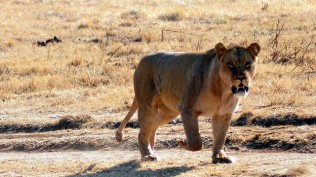
Less than a month ago, an Australian tourist was enjoying his safari tour and taking in the beauty of what is perhaps Africa’s most impressive predator. Quite unexpectedly one lion reportedly came through the open car window and began sampling the human goods on board.
Brendan Smith, who is originally from Perth, had arrived in Johannesburg, South Africa 36 hours prior to his unexpected encounter. While many have been quick to label the attack as the unpredictable behavior of a “vicious predator,” the event underscores the effects that increasing human encroachment can have on African wildlife.
A Concerning Trend
The recent attack isn’t an outlier when it comes to human-animal interactions on African safaris. Even more recently, a woman was killed in a lion attack while touring a private wildlife park in Johannesburg. According to Scott Simpson, assistant operations manager at the Lion Park, “a lioness approached the passenger side of the vehicle as the woman took photos and then lunged.”
“They had their windows all the way down, which is strictly against policy,” continued Simpson. “The lion bit the lady through the window.” The driver of the vehicle reportedly attempted to punch the animal but was scratched in the process. While park staff quickly ran the lion off and an ambulance arrived shortly thereafter, the woman was unable to survive the attack.
According to CBS News correspondent Clarissa Ward, the Lion Park in Johannesburg “is one of dozens of places in South Africa where tourists, many of them Americans, pay top dollar for the privilege of petting lion cubs. The parks breed their lions constantly to ensure a supple of cubs year round, but once the lions reach maturity, they are too dangerous to be near tourists.”
While the park insists that no attack would’ve occurred if proper safety precautions were taken, these attacks exemplify our minimal understanding of how the effects of captivity can alter expected animal behavior. This video shows a lion effortlessly opening a car door while the family is casually watching from what they believe to be a safe enclosure.
The Sustainability of Safari Tourism
According to the International Livestock Research Institute, wildlife populations in one of the region’s most popular safari reserves, the Maasai Mara, have been steadily decreasing. The numbers suggest that giraffe populations are down 95 percent, warthogs down 80 percent, hartebeest down 76 percent, and impala down 67 percent. These decreases foreshadow similar trends for the reserve’s larger carnivores as well.
In previous years, more than 1.2 million wildebeest have made the migration from Tanzania’s Serengeti up into the Mara plains. Recent studies suggest that migratory numbers have dropped to a paltry 300,000 in comparison. According to Brian Heath, chairman of the Mara Conservancy Trust, “the migrations into the Mara will not be sustained if the numbers keep falling as they have in recent years.”
The underlying issue with safaris is one that pervades many forms of tourism today. Because tourists are merely temporary visitors, and tour operators are primarily concerned with serving these visitors, any thoughts of preserving the environment and the wildlife are typically subjugated to the financial bottom line.
The irony here is in the fact that, without a pristine environment and breathtaking wildlife, the safari operators would have no demand for their services. In other words, continuing to operate safaris under the “status quo” may result in these safaris running themselves out of business. Unfortunately, this will be at the cost of the African wildlife and their habitat.
Striving for Sustainable Safari Tourism
As an industry, safari tourism needs to be put under the microscope, as do many currently destructive forms of tourism. While safari tourism is a significant economic generator for many African nations’ efforts to further protect wildlife and their habitat, more oversight may be necessary to ensure that gains from safari tourism are put to use in the most sustainable manner possible.
If you wish to learn more about a potential model for more sustainable safari tourism operations, please check out the unique approach taken by Dereck Joubert and his partners at Africa Travel, as outlined in this article.
In addition, please check out this article detailing how the safari model is being applied to tours of human settlements, and how this is negatively affecting indigenous peoples around the world.
Read Ethical Traveler's Reprint Policy.
